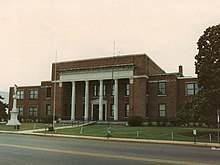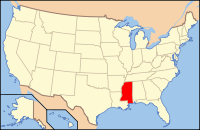Neshoba County
| Neshoba County, Mississippi | |
|---|---|
| County | |

Neshoba County courthouse in Philadelphia
|
|
 Location in the U.S. state of Mississippi |
|
 Mississippi's location in the U.S. |
|
| Founded | 1833 |
| Seat | Philadelphia |
| Largest city | Philadelphia |
| Area | |
| • Total | 572 sq mi (1,481 km2) |
| • Land | 570 sq mi (1,476 km2) |
| • Water | 1.5 sq mi (4 km2), 0.3% |
| Population (est.) | |
| • (2015) | 29,463 |
| • Density | 52/sq mi (20/km²) |
| Congressional district | 3rd |
| Time zone | Central: UTC-6/-5 |
| Website | www |
Neshoba County is a county located in the U.S. state of Mississippi. As of the 2010 census, the population was 29,676. Its county seat is Philadelphia. The name is derived from the Choctaw word nashoba meaning Wolf.
The county is known for the Neshoba County Fair and harness horse races. It is also home of the Williams Brothers Store, which has been in operation since the early 1900s.
The Mississippi Band of Choctaw Indians (MBCI) own one of the largest casino complexes in the state. The Silver Star and Golden Moon casinos are the first land based casinos in Mississippi. These casinos are part of the MBCI's Pearl River Resort.
Neshoba County is known as the site of one of the most infamous race-related crimes in American history. In 1964, the brutal murders of Chaney, Goodman, and Schwerner by white supremacists, including Deputy Sheriff Cecil Price, in Philadelphia, the county seat. The crime and decades-long legal aftermath inspired the 1988 movie Mississippi Burning.
President Ronald Reagan launched his 1980 presidential campaign from the Neshoba County Fair, delivering a speech about economic policy that drew attention for the use of the phrase "states' rights" in an area associated with the 1964 murders.
...
Wikipedia
